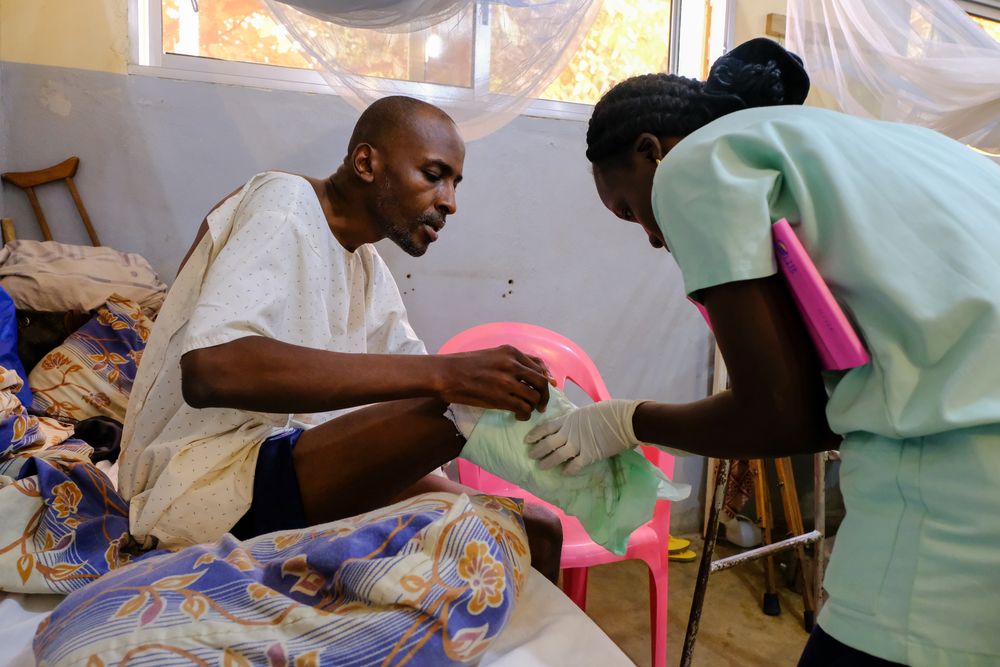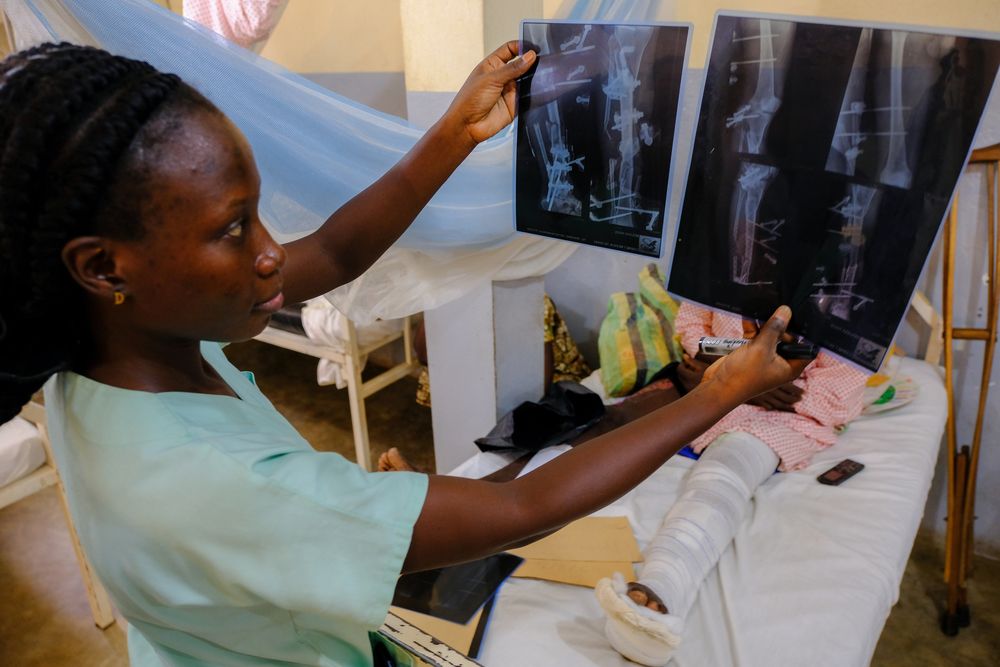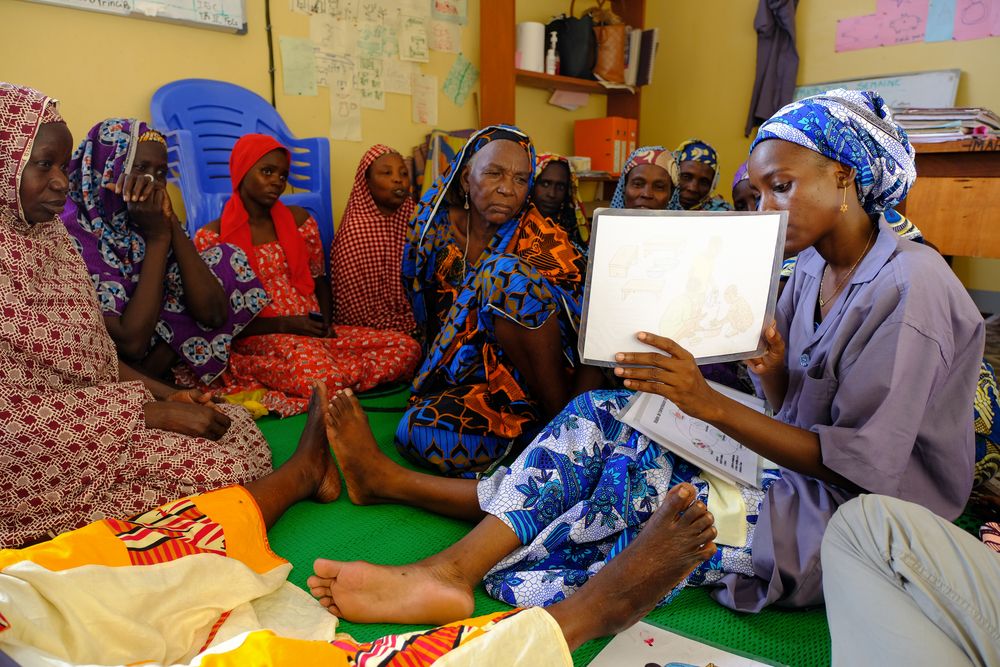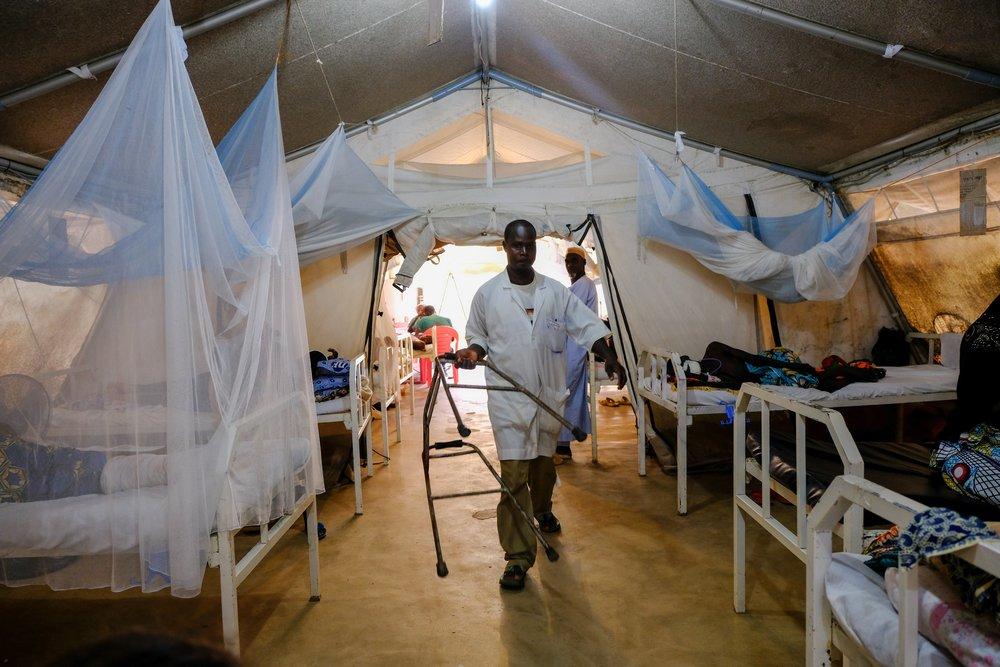At the Regional Hospital Maroua in the Far North Region of Cameroon, Doctors Without Borders (MSF) supports the Ministry of Health in treating patients with complicated fractures, severe soft tissue and abdominal infections or burn wounds.
Complementing the surgical and emergency medical care, a team of physiotherapists, psychologists, and health promoters supports patients to recover and return to daily life.
As part of an operational research project, Humanity & Inclusion (HI), MSF, and the Karolinska Institutet are piloting a new physiotherapy assessment tool to help patients regain independence.

Damien* carefully positions his crutches on the stair below him, then swings his left leg onto the next step and balances out his weight. It is only the second time the 35-year old is leaving his bed after his right lower leg had to be amputated two weeks ago due to a gangrene infection.
“I need to regularly clean and dress the wound and I am still in a lot of pain, but I know I have to move as much as possible to get better”, he said, completing his physiotherapy exercise on the short stairs.
Damien is one of nearly one hundred patients requiring urgent medical attention, surgery or wound care at the Regional Hospital Maroua in the Far North Region of Cameroon.
The hospital offers comprehensive trauma care, a fully equipped maternity ward, pediatric care and internal medicine. MSF supports the Ministry of Health by running the operating theatre for emergency surgery and providing post-operative care.
“We receive a lot of patients with severe injuries such as limb fractures or brain injury from traffic accidents or violence, but also treat victims with burns, abdominal injuries, or infections like necrotizing fasciitis”, MSF doctor Abba Madam Abakouira explained.
The MSF medical team at the hospital performs lifesaving surgeries, treats complicated fractures, infected wounds, and offers a range of rehabilitation services including physiotherapy and psychosocial support.
For many patients in Maroua, complicated injuries or infections result in long hospital stays, making early and regular rehabilitation activities particularly important.
Patients who are bedridden or stay immobilized too long are at risk of developing severe stiffness and muscle loss, chest infections, or bedsores and hinder their return to work.
Two to three physiotherapy staff work at the hospital, offering tailored exercises, and motivating patients to mobilize as early and as much as possible.
Their job is a challenging one as space to perform the exercises within the hospital is very limited, and many patients are reluctant to move due to fatigue, pain, fear of moving, or missing information.

MSF psychologist Raelle Miamekongo Ermione helps to address these motivational issues with patients. “For our youngest patients, we organize daily activities like a kids dance or animated film night to get them out of bed in a playful way”, she said.
For adults, early mobilization depends on better patient information, personal motivation, and the help of family or community members.
“My leg hurts a lot and I need someone to help me to get out of bed and walk with the rollator”, said Mary*, whose right leg is heavily swollen due to necrotizing fasciitis, an infection with a flesh-eating bacteria.
John*, who fractured his foot and lower leg in a traffic accident, had an external fixator put into place: a set of metal screws holding his bone in place and carbon bars stabilizing them on the outside of his foot.
“I felt it would be best not to move my toes or upper leg too much until the surgeon removes the fixator, and was not fully aware of how important these small movements are”, he observed.
For patients like Damien, Mary and John, the rehabilitation team in Maroua is currently piloting a new patient assessment and treatment tool. The Activity Independence Measure for Patients after Trauma (AIM-T) is a set of twelve simple exercises of daily life.
“We ask patients to walk a short distance, grab small objects or turn over in bed, to see whether they use an aid or need human assistance”, physiotherapist Moulou Talba explained.
Scoring these activities helps her and her colleagues to understand how independent patients are, plan the course of the treatment, and communicate progress to colleagues and patients.
At the same time, the AIM-T is a data collection tool and part of an international operational research project led by HI, MSF, and the Karolinska Institut, with study sites in Burundi, Cameroon, the Central African Republic, and Gaza.

“Our objective is to better understand how patients recover after trauma and explore factors that support or hinder patients in regaining independence”, said Bérangère Gohy, research coordinator and project lead with HI.
“Only very limited evidence on early rehabilitation or treatment outcomes is available from humanitarian settings, and we expected the AIMT-T to significantly improve monitoring and reporting for our own and partner projects”, she added.
At the Maroua Regional Hospital, the physiotherapy team is now validating the AIM-T with the first group of 50 patients. Directly after, 170 patients will be enrolled for a six months follow-up using the AIM-T.
“We need to make sure the score works in different contexts and settings from Cameroon to Gaza so that patients are able to understand follow adequate rehabilitation”, Bérangère explained.
The importance of early mobilization is also a key message for patients and their families and will be included in the health promotion activities at the hospital.
“We engage patients and their caretakers on a range of important health topics, and organize several information sessions and group discussions every day”, “said Urbain Tchoucnoba, head of the hospital’s health promotion team.
“Successful rehabilitation requires surgeons, doctors, nursing staff, but also mental health specialists, physiotherapists, health promoters, and not least the patients and their caregivers to work together”, said Moulou Talba.
While the AIM-T facilitates this team’s work and communication, the evidence it generates promises to improve trauma care in humanitarian settings in the long run.
* Names have been changed to protect patient privacy
Read about MSF's activities in Cameroon
